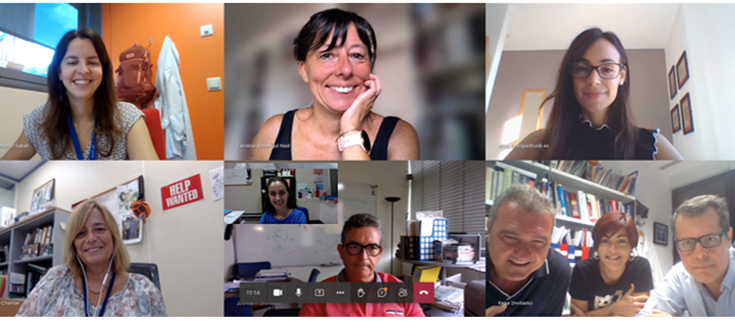Research impulse into hepatoblastoma, the main childhood liver cancer

Kick-off meeting Intramural Project 2022. From top to bottom, from left to right: Montse Domingo and Carolina Armengol, Elisa Lozano, Maria Luz Martinez-Chantar, Rocío Rodríguez and José Juan García-Marín, Pedro Berraondo, Maite García and Matías Avila.
A collaborative CIBER project will boost hepatoblastoma (HB) research to identify new therapeutic targets that will allow strategies to be developed to improve the prognosis of those children who currently do not survive the disease. The project coordinated by Carolina Armengol, principal CIBEREHD researcher at the Germans Trias i Pujol Research Institute (IGTP) is a collaboration between 5 CIBER groups belonging to the Hepatic and Digestive Diseases area (CIBEREHD) and the Cancer area (CIBERONC).
HB is the main childhood liver cancer. It is an extremely rare disease with an approximate incidence of one case in one million children per year. HB responds well to chemotherapy, although the prognosis is still dire in 20% of cases, mostly metastatic HB. The failure of the pharmacological treatment used before and/or after the surgical resection of primary and metastatic tumours is associated with a poor prognosis.
To reach the project objectives, a collection of biological samples from pediatric patients with HB has been established as its basis, this is the result of a 12-year effort by Dra. Armengol, who defines the collection of samples as "unique in the world". The collection will be used to study aspects of the biology of HB, such as post-translational modifications, immunity and epigenetic mechanisms that are unknown up to now.
The defining characteristic of this project is the synergy between CIBER's complementary groups to carry out basic and translational research on HB. In addition to Carolina Armengol's group, the groups coordinated by: Mª Luz Martínez Chantar (CIC Biogune), Elisa Lozano (University of Salamanca), Matías Avila and Pedro Berraondo (CIMA, University of Navarra) are also part of the project. "The ultimate objective of this project is to offer innovative therapeutic strategies such as immunotherapy, epigenetic modulation and collateral sensitization for those patients who do not respond to current treatments," the researchers conclude.
News shared with:



